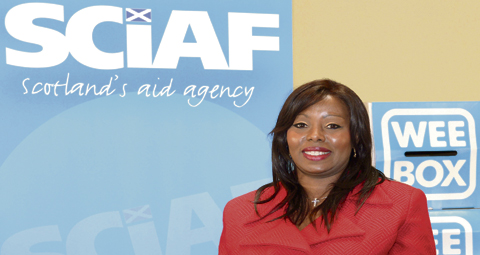March 8 | ![]() 0 COMMENTS
0 COMMENTS ![]() print
print

What can you do for God?
— SCIAF executive director Patricia Chalé says your help to do God’s work would be a ‘prayer answered,’ and SCO editor LIZ LEYDON thinks this engaging, open woman might be the answer to the Catholic aid agency’s prayers
People in our society often approach milestone birthdays, the ones with a big ‘0’ that take the celebrant into another decade, with a mixture of dread and amazement at how quickly time passes with a few drops of regret looking back and hope looking forwards thrown in. The reality is many of us here in Scotland do not realise how lucky we are to reach these milestones.
Patricia Chalé, the newly appointed executive director of the Scottish Catholic International Aid Fund (SCIAF), had a more personal and profound revelation upon approaching her 50th birthday. The former international management consultant in human resources management and organisational development, both in the UK and overseas, felt blessed to discover a new calling rather than a midlife crisis.
“I had given the first 50 years of my life to work,” she told the SCO. “I was wanting to do something for God.”
And this woman, who has more energy, optimism and drive than many half her age, wants our help to ensure the vital work of SCIAF continues.
Giving back
Ms Chalé, the daughter of a diplomat, was born and grew up in the Catholic Faith in an African family. Her father was called to help establish Tanzania and ‘build a nation’ and she herself was called to work throughout Europe, the Middle East and Africa during her career. Educated at Brunel University and Westminster University, she played an active role in parish life at Sacred Heart, Wimbledon, as a volunteer, reader and Eucharistic minister. Then she began to wonder what other skills she had that could benefit the Church. Last May she became the founding director of Caritas Westminster, ‘primarily to set up’ the organisation, an role she said was her ‘prayer answered.’
“It gave me the opportunity to tackle issues such as poverty and social justice in England,” she said.
And when, a few months later, recruiters for the bishops of Scotland approached her about the vacant top position at SCIAF, it allowed her to approach these issues on a global scale-which was ‘another prayer answered.’
“I had asked God: ‘how do I use my skills,’ both technical and practical, in the Church,” she said. “Providence is amazing. I can bring my technical expertise, international experience and my passion for dealing with poverty and injustice to SCIAF. I am longing to give the next 50 years of my life to God.”
Challenges and hopes
Just as SCIAF, an agency of the Bishops’ Conference of Scotland, has grown and evolved significantly since its foundation in 1965, so have the challenges it faces and the hopes of its board and staff, who have worked tirelessly to keep the agency on track since the departure of former chief executive Paul Chitnis in June 2011.
Ms Chalé, who now lives in Glasgow’s West End, is rapidly aclimatising to Scottish culture and the close knit Catholic society here, something she thinks ‘makes it easier to get things done.’ As literally and figuratively the ‘new face’ of SCIAF, she also sees her ethnicity as a distinct advantage.
With so many Scots growing up with the concept of helping the ‘black babies’ through charitable giving, Ms Chalé believes it is a unique and distinct advantage to have a ‘non Caucasian’ SCIAF director who actually knows first hand what life is like in the developing world.
“I still have relatives in Tanzania who live in the most basic conditions, as judged by our standards here in Scotland,” she said.
As a modern, working woman in the UK she can ‘heat and eat’ her meals but Ms Chalé highlights that in Africa, and many other countries, people have to grow vegetables if they want to eat them, walk for water if there is no well in their compound and wait for soap to be re-stocked in the nearest town when it runs out.
“The work I am doing now is helping my family,” she said. “And my mother is wildly excited she finally has a child working for God.”
Mission statement
In a crowded charitable sector in tough financial times, and in the complex field of international development, she wants to increase SCIAF’s visibility. Although she is delighted with the response to the recent SCIAF emergency appeal for Syria, she sees SCIAF as a ‘good brand’ whose Catholic message may have been ‘lost in translation’ somewhat along the way throughout the years. She would like to have SCIAF, traditionally embraced in parishes and schools, return to the fold like the ‘prodigal son’ in the places where it began.
Ms Chalé is impressed by SCIAF investment in promoting selfhelp and self sufficiency, something she says her extended family overseas is also proud of.
“Our work is based on the important principle that if you teach a man to fish he can feed himself,” she said. “Helping people is not just food and aid. By working with local churches, people can tell us what they need.”
Ms Chalé recognises the challenges for Catholic organisations in international development but sees more overlap than conflict in current thinking.
She said that modern international development theory backs a right-based approach to international development.
“And that is no different from Catholic social teaching,” she said. “It is all about empowering people.”
She says the motto on the Wee Box, Big Change campaign for Lent, a hand up not a hand out, is admirable and that she recognised that this is a campaign that many Scots, including SCIAF supporter Susan Boyle, grew up with and relate to. It is a legacy she wants to build upon.
Future
SCIAF currently works in 15 countries and Ms Chalé hopes to expand its reach in those countries and take its programmes to others. It is a plan that will need work and support.
“We need to better link our advocacy work and our campaigns to our programmes,” she said. “We need to explain in the most basic terms what it is we do.
“People do not always see the direct connection. We need to clear a path to it.”
She also wants to build on SCIAF’s work with schools and extend it to programmes for older students, such as the Pope Benedict XVI Caritas Award, and to universities, teacher training programmes and seminaries.
Ms Chalé has many of her own ideas about the need for and benefits of an inter-agency approach to international development but she wants to extend her personal invitation to the Scottish community to tell her what we think SCIAF could and should be doing.
“There are many people out there with ideas better than mine about how they would to take SCIAF forward,” she said. “We do good work but we can do more.
“We are in the division tables and we deserve to be in the premier league.
“I want to make sure SCIAF is the charity of choice for Catholics because of the work we do.
“We can only get there by people coming to talk to me, so please help me develop SCIAF. This is your SCIAF. I am here as a custodian. When the job God has asked me to do is finished I will move on.
“SCIAF is only here because people support us.”
— Contact [email protected]
PIC: PAUL McSHERRY










